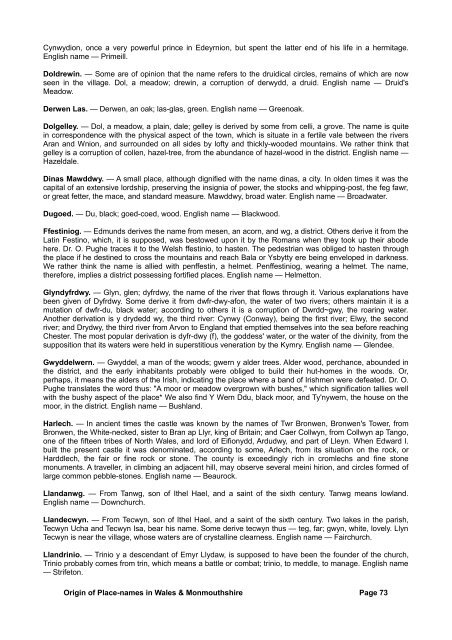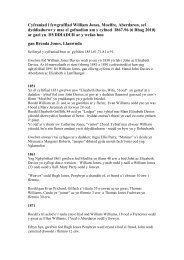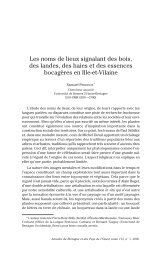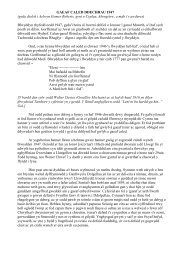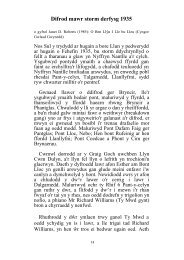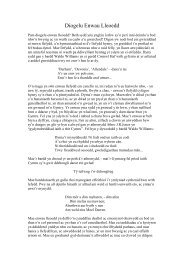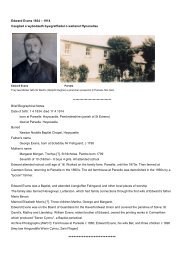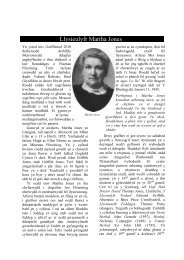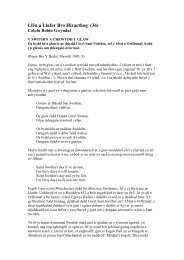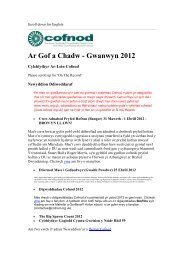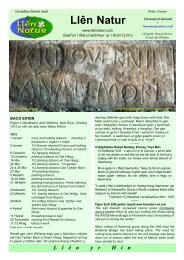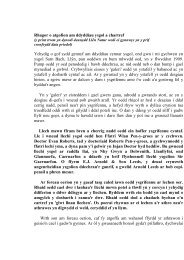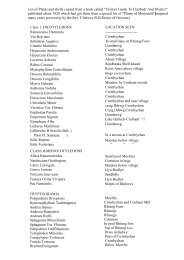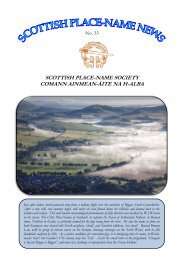handbook of the origin of place-names in wales and monmouthshire
handbook of the origin of place-names in wales and monmouthshire
handbook of the origin of place-names in wales and monmouthshire
- No tags were found...
You also want an ePaper? Increase the reach of your titles
YUMPU automatically turns print PDFs into web optimized ePapers that Google loves.
Cynwydion, once a very powerful pr<strong>in</strong>ce <strong>in</strong> Edeyrnion, but spent <strong>the</strong> latter end <strong>of</strong> his life <strong>in</strong> a hermitage.English name — Primeill.Doldrew<strong>in</strong>. — Some are <strong>of</strong> op<strong>in</strong>ion that <strong>the</strong> name refers to <strong>the</strong> druidical circles, rema<strong>in</strong>s <strong>of</strong> which are nowseen <strong>in</strong> <strong>the</strong> village. Dol, a meadow; drew<strong>in</strong>, a corruption <strong>of</strong> derwydd, a druid. English name — Druid'sMeadow.Derwen Las. — Derwen, an oak; las-glas, green. English name — Greenoak.Dolgelley. — Dol, a meadow, a pla<strong>in</strong>, dale; gelley is derived by some from celli, a grove. The name is quite<strong>in</strong> correspondence with <strong>the</strong> physical aspect <strong>of</strong> <strong>the</strong> town, which is situate <strong>in</strong> a fertile vale between <strong>the</strong> riversAran <strong>and</strong> Wnion, <strong>and</strong> surrounded on all sides by l<strong>of</strong>ty <strong>and</strong> thickly-wooded mounta<strong>in</strong>s. We ra<strong>the</strong>r th<strong>in</strong>k thatgelley is a corruption <strong>of</strong> collen, hazel-tree, from <strong>the</strong> abundance <strong>of</strong> hazel-wood <strong>in</strong> <strong>the</strong> district. English name —Hazeldale.D<strong>in</strong>as Mawddwy. — A small <strong>place</strong>, although dignified with <strong>the</strong> name d<strong>in</strong>as, a city. In olden times it was <strong>the</strong>capital <strong>of</strong> an extensive lordship, preserv<strong>in</strong>g <strong>the</strong> <strong>in</strong>signia <strong>of</strong> power, <strong>the</strong> stocks <strong>and</strong> whipp<strong>in</strong>g-post, <strong>the</strong> feg fawr,or great fetter, <strong>the</strong> mace, <strong>and</strong> st<strong>and</strong>ard measure. Mawddwy, broad water. English name — Broadwater.Dugoed. — Du, black; goed-coed, wood. English name — Blackwood.Ffest<strong>in</strong>iog. — Edmunds derives <strong>the</strong> name from mesen, an acorn, <strong>and</strong> wg, a district. O<strong>the</strong>rs derive it from <strong>the</strong>Lat<strong>in</strong> Fest<strong>in</strong>o, which, it is supposed, was bestowed upon it by <strong>the</strong> Romans when <strong>the</strong>y took up <strong>the</strong>ir abodehere. Dr. O. Pughe traces it to <strong>the</strong> Welsh ffest<strong>in</strong>io, to hasten. The pedestrian was obliged to hasten through<strong>the</strong> <strong>place</strong> if he dest<strong>in</strong>ed to cross <strong>the</strong> mounta<strong>in</strong>s <strong>and</strong> reach Bala or Ysbytty ere be<strong>in</strong>g enveloped <strong>in</strong> darkness.We ra<strong>the</strong>r th<strong>in</strong>k <strong>the</strong> name is allied with penffest<strong>in</strong>, a helmet. Penffest<strong>in</strong>iog, wear<strong>in</strong>g a helmet. The name,<strong>the</strong>refore, implies a district possess<strong>in</strong>g fortified <strong>place</strong>s. English name — Helmetton.Glyndyfrdwy. — Glyn, glen; dyfrdwy, <strong>the</strong> name <strong>of</strong> <strong>the</strong> river that flows through it. Various explanations havebeen given <strong>of</strong> Dyfrdwy. Some derive it from dwfr-dwy-afon, <strong>the</strong> water <strong>of</strong> two rivers; o<strong>the</strong>rs ma<strong>in</strong>ta<strong>in</strong> it is amutation <strong>of</strong> dwfr-du, black water; accord<strong>in</strong>g to o<strong>the</strong>rs it is a corruption <strong>of</strong> Dwrdd~gwy, <strong>the</strong> roar<strong>in</strong>g water.Ano<strong>the</strong>r derivation is y drydedd wy, <strong>the</strong> third river: Cynwy (Conway), be<strong>in</strong>g <strong>the</strong> first river; Elwy, <strong>the</strong> secondriver; <strong>and</strong> Drydwy, <strong>the</strong> third river from Arvon to Engl<strong>and</strong> that emptied <strong>the</strong>mselves <strong>in</strong>to <strong>the</strong> sea before reach<strong>in</strong>gChester. The most popular derivation is dyfr-dwy (f), <strong>the</strong> goddess' water, or <strong>the</strong> water <strong>of</strong> <strong>the</strong> div<strong>in</strong>ity, from <strong>the</strong>supposition that its waters were held <strong>in</strong> superstitious veneration by <strong>the</strong> Kymry. English name — Glendee.Gwyddelwern. — Gwyddel, a man <strong>of</strong> <strong>the</strong> woods; gwern y alder trees. Alder wood, perchance, abounded <strong>in</strong><strong>the</strong> district, <strong>and</strong> <strong>the</strong> early <strong>in</strong>habitants probably were obliged to build <strong>the</strong>ir hut-homes <strong>in</strong> <strong>the</strong> woods. Or,perhaps, it means <strong>the</strong> alders <strong>of</strong> <strong>the</strong> Irish, <strong>in</strong>dicat<strong>in</strong>g <strong>the</strong> <strong>place</strong> where a b<strong>and</strong> <strong>of</strong> Irishmen were defeated. Dr. O.Pughe translates <strong>the</strong> word thus: "A moor or meadow overgrown with bushes," which signification tallies wellwith <strong>the</strong> bushy aspect <strong>of</strong> <strong>the</strong> <strong>place</strong>* We also f<strong>in</strong>d Y Wern Ddu, black moor, <strong>and</strong> Ty'nywern, <strong>the</strong> house on <strong>the</strong>moor, <strong>in</strong> <strong>the</strong> district. English name — Bushl<strong>and</strong>.Harlech. — In ancient times <strong>the</strong> castle was known by <strong>the</strong> <strong>names</strong> <strong>of</strong> Twr Bronwen, Bronwen's Tower, fromBronwen, <strong>the</strong> White-necked, sister to Bran ap Llyr, k<strong>in</strong>g <strong>of</strong> Brita<strong>in</strong>; <strong>and</strong> Caer Collwyn, from Collwyn ap Tango,one <strong>of</strong> <strong>the</strong> fifteen tribes <strong>of</strong> North Wales, <strong>and</strong> lord <strong>of</strong> Eifionydd, Ardudwy, <strong>and</strong> part <strong>of</strong> Lleyn. When Edward I.built <strong>the</strong> present castle it was denom<strong>in</strong>ated, accord<strong>in</strong>g to some, Arlech, from its situation on <strong>the</strong> rock, orHarddlech, <strong>the</strong> fair or f<strong>in</strong>e rock or stone. The county is exceed<strong>in</strong>gly rich <strong>in</strong> cromlechs <strong>and</strong> f<strong>in</strong>e stonemonuments. A traveller, <strong>in</strong> climb<strong>in</strong>g an adjacent hill, may observe several me<strong>in</strong>i hirion, <strong>and</strong> circles formed <strong>of</strong>large common pebble-stones. English name — Beaurock.Ll<strong>and</strong>anwg. — From Tanwg, son <strong>of</strong> I<strong>the</strong>l Hael, <strong>and</strong> a sa<strong>in</strong>t <strong>of</strong> <strong>the</strong> sixth century. Tanwg means lowl<strong>and</strong>.English name — Downchurch.Ll<strong>and</strong>ecwyn. — From Tecwyn, son <strong>of</strong> I<strong>the</strong>l Hael, <strong>and</strong> a sa<strong>in</strong>t <strong>of</strong> <strong>the</strong> sixth century. Two lakes <strong>in</strong> <strong>the</strong> parish,Tecwyn Ucha <strong>and</strong> Tecwyn Isa, bear his name. Some derive tecwyn thus — teg, far; gwyn, white, lovely. LlynTecwyn is near <strong>the</strong> village, whose waters are <strong>of</strong> crystall<strong>in</strong>e clearness. English name — Fairchurch.Ll<strong>and</strong>r<strong>in</strong>io. — Tr<strong>in</strong>io y a descendant <strong>of</strong> Emyr Llydaw, is supposed to have been <strong>the</strong> founder <strong>of</strong> <strong>the</strong> church,Tr<strong>in</strong>io probably comes from tr<strong>in</strong>, which means a battle or combat; tr<strong>in</strong>io, to meddle, to manage. English name— Strifeton.Orig<strong>in</strong> <strong>of</strong> Place-<strong>names</strong> <strong>in</strong> Wales & Monmouthshire Page 73


